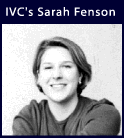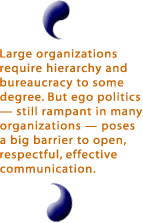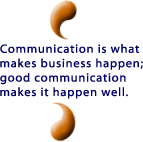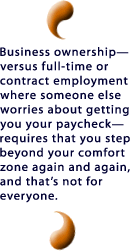
Ivy Sea Collaboration Network member Sarah Fenson caught up with Jamie Walters, Ivy Sea's founder, for a discussion about professional-association (IABC) board involvement, business ownership and organizational communication.
SF—What’s your professional background?
JW—Before I started my business in late 1992, I worked for a hotel, two state legislators, a cosmetics manufacturer, an environmental consulting firm and the Virginia Superfund Program. Since my husband was a naval officer for quite a few years, I got to put my skills to work for a variety of organizations. I earned my degree from St. John Fisher College in Rochester, NY, which, in the Basilian tradition, emphasized the important balance between contemplation and action. My parents were self-employed, too, so my training started pretty early.

JW—I got active on the SF/IABC board in 1992, and served as University Relations Director, ’92/93; President-Elect and VP Membership, ’94; President, ’95 and Past President, ’96.
SF—Communication has been a significant part of your career; how do you see communication?
JW—Communication, be it interpersonal or organizational, is so much more than a series of pretty publications, be they print or electronic. The vehicles are certainly important, and that they’re done with care and skill is crucial for an effective program. But effective at what? That’s where you get to the core of communication. What’s it about? It should be about building relationships that allow people to make their full contribution to an organization’s culture and success.

SF—What hurdles do you see for organizational communicators?
JW—I’d love to say none, but I see many. First, hierarchy and bureaucracy pose a hurdle to any kind of change or transformation effort. It assumes some people are more important than others, or that process is more important than people. Large organizations require hierarchy and bureaucracy to some degree. But ego politics — still rampant in many organizations — pose a big barrier to truly open, respectful, effective communication.
We’ve worked with organizations attempting transformation, and it takes a lot of heart and persistence to bring about the change envisioned. Usually, it’s more like a rubber band: you stretch it out of its former shape and as soon as you let go it snaps back with a vengeance. You have to have a group of strong people who really want change enough to persevere through a series of those nasty snaps!
Another barrier is the incredible turf mentality present in so many corporate environments. We even see it perpetuated in communication journals talking about the Evil HR people or IT folks — very Us versus Them, when it’s really just Us. For communicators to have real impact, they need to bridge those gaps and create collaborative relationships with their colleagues in other departments; forge partnerships to gain strength, just as the business itself is doing.

JW—The whole experience. Owning a business has been, by far, the most challenging and rewarding educational experience I’ve had. You become intimately familiar with your strengths and weaknesses, because you brush up against them every day. I’d be bored without that non-stop growth and learning. I just love small business and small-business owners; I’m proud to belong to the Small-Business Owner club.
I also really enjoy the variety, and helping clients solve problems, navigate challenges and open up to new options and types of growth.
SF—What’s been most challenging?
JW—Learning to hire with my head instead of my heart. At various points along my experience, or maybe inexperience, curve, we hired several people who just weren’t suited to an intense, organic, start-up consulting environment. We liked them very much personally and believed in them professionally, but in the end, the business dictates. Mismatches don't benefit anyone. Fortunately, I'm not particularly slow to make a decision once I see a mismatch.

JW—I have a much clearer understanding of the challenges leaders face and the demands of running a business. The decisions seem easy when you aren’t responsible for the whole operation or assuming very personal risks. I can better understand the impulse to send a memo instead of facing the angry masses. From another perspective, because business is so very competitive, being an excellent communicator gives you a serious edge. Communication is what makes business happen; good communication makes it happen well.
SF—What would you say to people considering self-employment or business ownership?
JW—Go for it, but know that it’s not a trip down Fantasy Lane. Most of the perceptions I hear about business ownership or self-employment are very, very glamorized or idealistic. People think you work whenever you feel like it, and have unbridled independence. The reality? It’s much harder and consumes much more time and energy than one can possibly imagine if you haven't done it. Business ownership — versus full-time or contract employment where someone else worries about getting you your paycheck — requires that you step beyond your comfort zone again and again, and that’s not for everyone.
The misperception of the self-employed person waking up at noon, then dabbling at work for an hour or two before watching the soaps, is ridiculous. That’s unemployment, not self-employment. The person who wants to play in the afternoon gets up at 4 a.m. or works until 1 a.m. to take care of business. There’s always that tradeoff, or nothing gets done and no money comes in. Period.
On the flip side, if you’re the right personality type for running your own show, love the non-stop pressure and challenge of generating your own paycheck and possibly others’ paychecks, love waking up every day to a blank slate you have to fill, then you’ll grow immensely, find out what you’re made of, and have a blast. That’s why The Economist magazine humorously suggested entrepreneurs are delusional. The things that would terrify most sane people appeal to an entrepreneur, just as extreme sports appeal to some athletes.
SF—Any parting thoughts for organizational communicators?
JW—Realize how fortunate it is to make a living doing something that can help make the workplace healthier and more sane, that can help people do their jobs more fully and productively, and can help leaders lead more effectively. As communicators, we should be walking models of the power of good communication. That’s an awesome challenge, but one that can bring immense reward and satisfaction.
For more information about IABC, visit the association's web site at iabc.com.
Copyright & Ivy Sea's New PDF Library: Ivy Sea Online content is protected by copyright. Contact us for guidelines about reprinting or distributing this or other Ivy Sea Online content, or for information about purchasing our budget-friendly, pre-packaged Ivy Sea PDF Content kits for use in your organizational training and communication programs. Get more information about reprints and the PDF Library.
Ivy Sea Organizational-Transformation and Conscious-Enterprise Consulting Services:
Visit About Ivy Sea or give us a call to learn how we can help you discover how to define your conscious-enterprise principles and vision, make the most of your organizational strengths, and rise to greater levels of mastery, success and meaningfulness as an individual, group or organization. How can we help you? We welcome your email inquiry.
Giving back: Ivy Sea Online is provided as a public-service resource available to all. If you appreciate the inspiration and free resources available to you on Ivy Sea Online, consider leaving a tip to help keep the generosity flowing. Even the smallest contribution helps to offset the costs of developing and maintaining this public-service site, and contributing is as easy as can be! Thank you!

What else would you like to see us cover? What are your key communication issues or experiences as a small- business owner? Let us know!